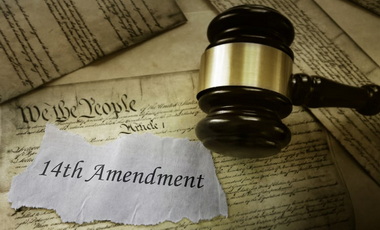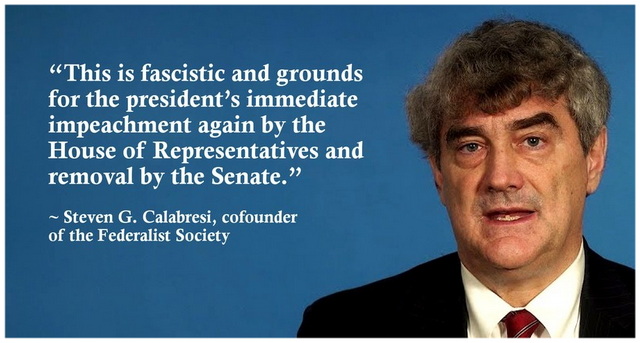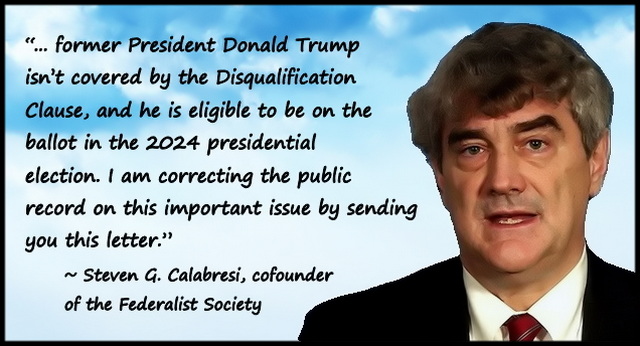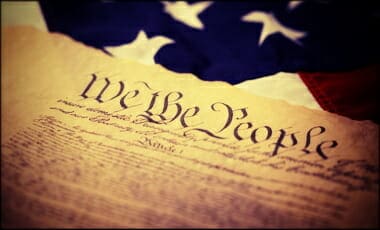Was Trump ‘an Officer of the United States’?
A careful look at the 14th Amendment’s Insurrection Clause shows that it doesn’t apply to him.
….A good deal of attention has focused thus far on whether the attack on the Capitol on Jan. 6, 2021, was an “insurrection or rebellion” and, if so, whether Mr. Trump “engaged” in it. Those questions, however, need not be answered until two preliminary questions of law are addressed: Is the presidency an “office . . . under the United States,” and was the presidential oath Mr. Trump swore on Jan. 20, 2016, to support the Constitution taken “as an officer of the United States”?
The latter question is easier. The use of the term “officer of the United States” in other constitutional provisions shows that it refers only to appointed officials, not to elected ones. In U.S. v. Mouat (1888), the Supreme Court ruled that “unless a person in the service of the government . . . holds his place by virtue of an appointment . . ., he is not, strictly speaking, an officer of the United States.” Chief Justice John Roberts reiterated the point in Free Enterprise Fund v. Public Company Accounting Oversight Board (2010): “The people do not vote for the ‘Officers of the United States.’ ”
Article VI of the Constitution provides that senators and representatives “and all executive and judicial Officers . . . of the United States” take an oath to support the Constitution. But the presidential oath is separately provided for at the end of Article II, Section 1, which would be superfluous if the president’s oath were required by the general language in Article VI. Mr. Trump took an oath as president pursuant to Article II, not as an officer pursuant to Article VI. Because the Insurrection Clause applies only to those who have taken an oath “as an officer of the United States,” he can’t be barred by that clause from serving in any capacity.
As for the former question, the language disqualifying a rebel from holding “any office . . . under the United States” follows the language disqualifying the rebel from office as “Senator or Representative in Congress, or elector of President and Vice President.” If “any office . . . under the United States” is broad enough to cover the president, it is certainly broad enough to cover senators, representatives and perhaps electors. Such a reading would make reference to those specific offices superfluous.
[….]
As for the former question, the language disqualifying a rebel from holding “any office . . . under the United States” follows the language disqualifying the rebel from office as “Senator or Representative in Congress, or elector of President and Vice President.” If “any office . . . under the United States” is broad enough to cover the president, it is certainly broad enough to cover senators, representatives and perhaps electors. Such a reading would make reference to those specific offices superfluous.
Is it plausible that the authors of the 14th Amendment specified senators, representatives and electors but meant to include the presidency and vice presidency under the general term “any office . . . under the United States”? Note that the term is “any office,” not “any other office,” which implies that the positions listed before it aren’t “offices under the United States,” because they are elected not appointed.
But that conclusion is uncertain. The phrase “office under the United States” appears four other times in the body of the Constitution, at least two of which—one barring officeholders from accepting a foreign title or emolument, and one barring anyone impeached and convicted from holding such an office—may well apply to an elected official, including the president. Also, if a holder of an “office under the United States” meant the same thing as “Officer of the United States,” why weren’t the same words used to specify it?
That may be puzzling, but as applied to Mr. Trump it is irrelevant, because—again—he didn’t take and thus didn’t violate an oath as an “Officer of the United States,” and so cannot be barred by the 14th Amendment from seeking re-election.
Even a criminal conviction wouldn’t bar him from seeking and winning the presidency. The Constitution specifies only that a person seeking that office be at least 35, a natural-born citizen and a 14-year U.S. resident. If Mr. Trump is to be kept from office, it will have to be done the old-fashioned way, the way it was done in 2020—by defeating him in an election.
Mr. Mukasey served as U.S. attorney general, 2007-09, and as a U.S. district judge, 1988-2006.




